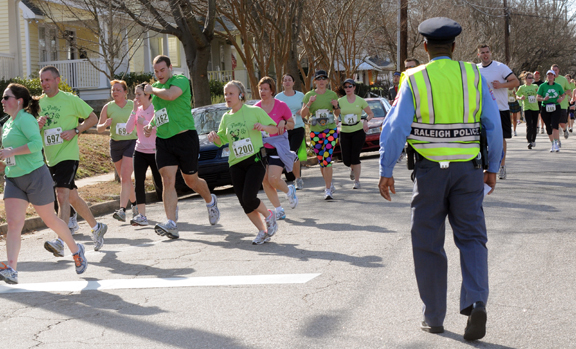The city of Raleigh may get a new set of policies for events that involve the use of public streets.
The issue arose in December when Raleigh City Council approved the city’s first national marathon, the Rock ‘n’ Roll Marathon Series, first to take place in April 2014 and then annually through 2018. The music-themed race, which took place in 34 cities in 2012, would displace one of the city’s largest charitable runs, the RunRaleigh Half-Marathon and 5K.

Karen Tam
A road race last year through Oakwood. Photo by Karen Tam.
The news set off members of the local road racing community—they want first dibs on dates in their own city— and prompted City Council members to study the way events are approved, tracked and managed.
Turns out, a record number of road running events are already in the works for 2013—82 of them, to be exact. Other road closures will happen for parades and street festivals throughout the year. Ten additional running events have also been proposed, but not yet approved by city police.
The discussion hit Council’s Law and Public Safety Committee Tuesday afternoon, and will resume in early February, when city officers propose a specific set of policies.
They could include:
- A limit on the number and/or nature of events in high-traffic areas, such as Hillsborough Street, downtown and on the greenways. Some residents have complained that the frequency of weekend events affects their ability to recreate freely. Others can’t leave their neighborhoods, even by bus, due to road closures.
“I hear about economic impact of these events. But as a citizen who is being inconvenienced, I have nothing to offer except a plea for relief and access to where I live,” said Brenda Jeffries, who lives in a seniors community one block from Hillsborough Street.
- Limited application periods each year, similar to methods used by the Raleigh Parks and Recreation Department to track and manage use of its facilities and greenways. A new application would clearly state the expectations of event organizers.
- Minimal fees based on the size of the event, to help cover city staff and police planning time.
- Oversight by a new or existing city authority, rather than city police.
- A system of grading the performance of the event and its organizers, to help the city decide which events to approve in the future. Also, a years-long contract option, similar to the Rock ‘n’ Roll marathon deal, for the most successful local events.
“If I was able to secure that for my races, that’d allow me to invest more capital into my business, advertise outside the community and attract more runners here,” said John Kane, owner of the Midtown Race Series, which will be displaced this June by the inaugural Ironman race.
- Better notification methods for events that require road closures. These could include a mobile messaging tool offered by SeeClickFix (currently used for reporting potholes, graffiti and street light outages), and a new city events website with a detailed calendar and road closure information.
- Priority for events organized or sponsored by the city. City Council would reserve the right to declare some events, such as the Rock ‘n’ Roll marathon, economic development events with rights over smaller activities.
“One of the benefits is the national exposure you get, and you can’t buy that,” said Councilwoman and Committee Chair Mary-Ann Baldwin.
- Consideration of alternate venues, such as certified 5K courses on city parkland. The Dorothea Dix property could be a prime candidate as it awaits redevelopment.
Baldwin pledged to the running community to account for their concerns as the final rules are drafted.
“We do have a challenge here,” she said. “We want to encourage races because they are good for the economy, good for recreation and good for Raleigh.”
What’s Next
The committee will take up the issue again Feb. 5.
